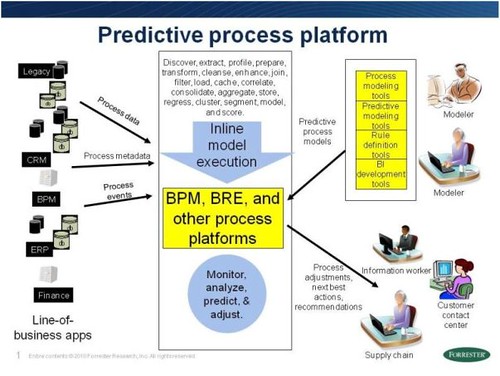Forrester Wave Findings: Customer Service Analytics Empower Predictive Process
The latest Forrester Wave on Customer Relationship Management (CRM) Customer Service Solutions includes 19 vendors evaluated against 196 criteria. As you can well imagine, it took time to compile the research and double-check the facts before we scored these sophisticated product suites.

Bill Band and I have just published the latest Forrester Wave on Customer Relationship Management (CRM) Customer Service Solutions. We included 19 vendors in this in-depth market study and evaluated their solutions against 196 criteria. As you can well imagine, it took time and a fine-toothed analytical comb to compile the research and double-check the facts before we scored these sophisticated product suites.
One of the key findings from this Forrester Wave is that a growing range of CRM vendors have incorporated deep analytics features into their customer service capabilities. Most provide embedded, out-of-the-box business intelligence (BI) features such as reporting, query, online analytical processing, dashboarding, scorecarding, and key performance indicators prebuilt to support their customer service applications. That's no surprise, because these core BI features enable enterprises everywhere to keep track of how well they're providing customer service across diverse CRM interaction channels and to identify opportunities to improve satisfaction, retention, upsell, agent productivity, and other key metrics.It was also interesting to see the growing incorporation of advanced analytics into CRM customer service suites. In particular, vendors such as Oracle, Microsoft, SAP, and Pegasystems/Chordiant offer embedded predictive models to drive real-time "next best offer" recommendations in call centers and portal-based customer service scenarios. As I discussed with Derek Miers and Connie Moore at the most recent Forrester IT Forum EMEA, CRM and other operational business applications are increasingly incorporating "predictive process" technologies to drive adaptive, agile responses to changing circumstances. This approach also goes by such diverse names as "decisioning," "decision automation," and "recommendation engines," and if you want to see a deeper discussion, check out this blogpost that I authored in February.
What you see below is the high-level architectural overview of what you need for a fully predictive platform driving CRM customer service and other operational processes:

Clearly, vendors are embedding these agile technologies in their CRM, enterprise resource planning (ERP), and other line-of-business applications. But the same time, enterprises also need to leverage inline predictive models across diverse business processes, so they're acquiring the underlying components from disparate vendors and integrating it all themselves. See my most recent Forrester Wave on Predictive Analytics and Data Mining (PA/DM) solutions for an in-depth discussion of commercial solutions for predictive analytics that may be deployed into many business processes.
CRM customer service suites that offer inline predictive models often provide out-of-box models for such core functions as customer retention and cross-sell optimization. Enterprises may customize these models or build their own from scratch, depending on the uniqueness of their requirements and the extent to which companies keep a professional cadre of in-house predictive modelers.
Going forward, business professionals must ask themselves whether they will always default to the out-of-box predictive models that the CRM suite vendor provides for key customer service functions. That may be a smart move when your predictive process initiative is new and you're leaning on the application vendor to bootstrap you on industry best practices. But as you attempt to differentiate from the competition and enable greater agility, you'll soon find yourself intricately tweaking out-of-box process models and rules to achieve greater retention, profitability, and other key business metrics. At that point, you may insist on the flexibility to run your own predictive models -- built in a tool other than the CRM customer service suite vendor's -- inside their application platform.
Will your CRM customer service application vendor allow you to do that? Ask them. If they intend to evolve their suites in this new age of agile processes, they'll need to let you incorporate models that were created in external tools and imported through open interfaces such as the Predictive Model Markup Language (PMML).
The fact that we're even discussing advanced analytics under the CRM customer service big-top shows that the market has evolved considerably in the past few years. Bill and I look forward to answering your inquiries surrounding the Forrester Wave on CRM Customer Service Solutions.The latest Forrester Wave on Customer Relationship Management (CRM) Customer Service Solutions includes 19 vendors evaluated against 196 criteria. As you can well imagine, it took time to compile the research and double-check the facts before we scored these sophisticated product suites.
About the Author
You May Also Like






